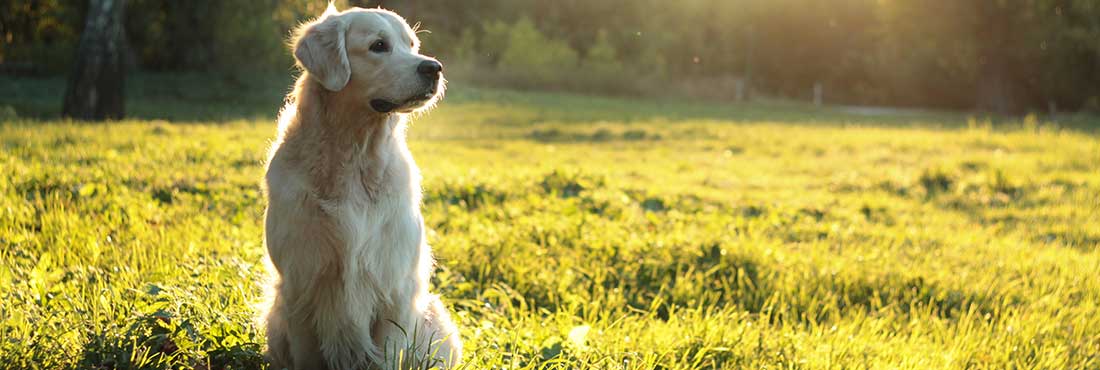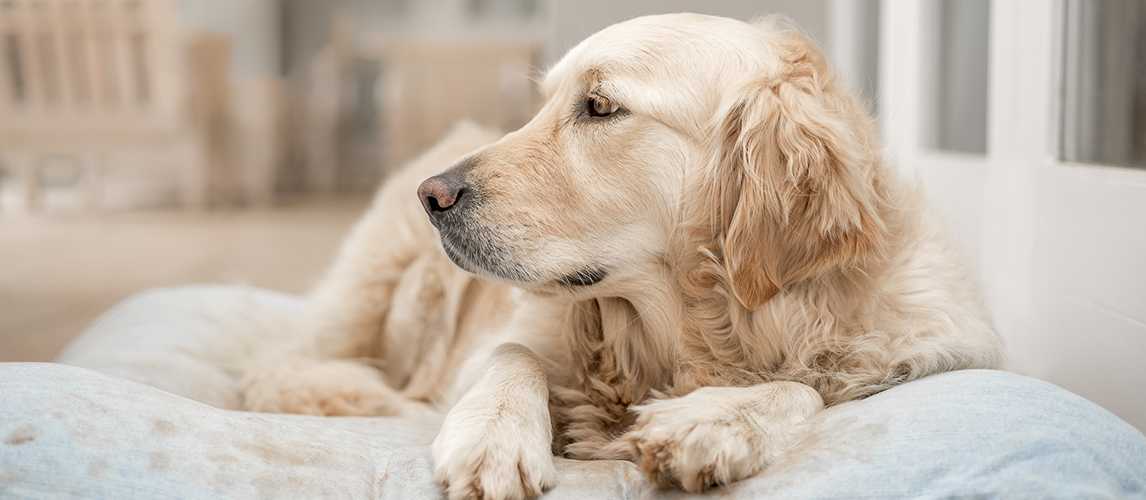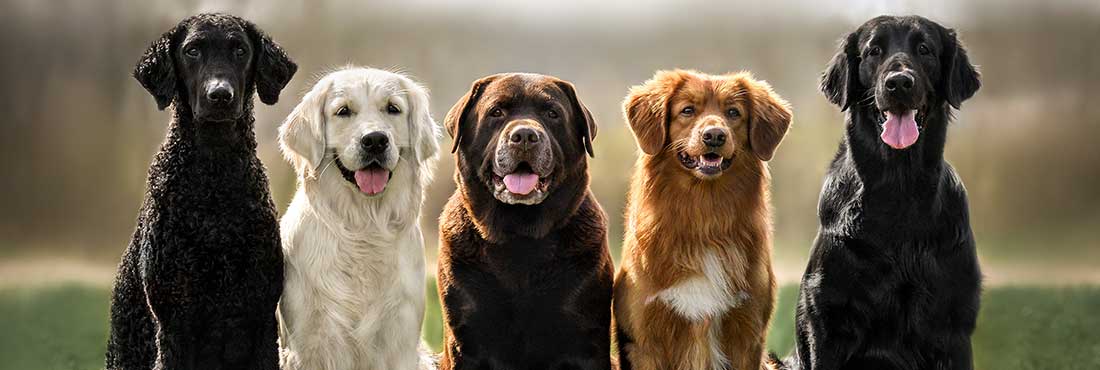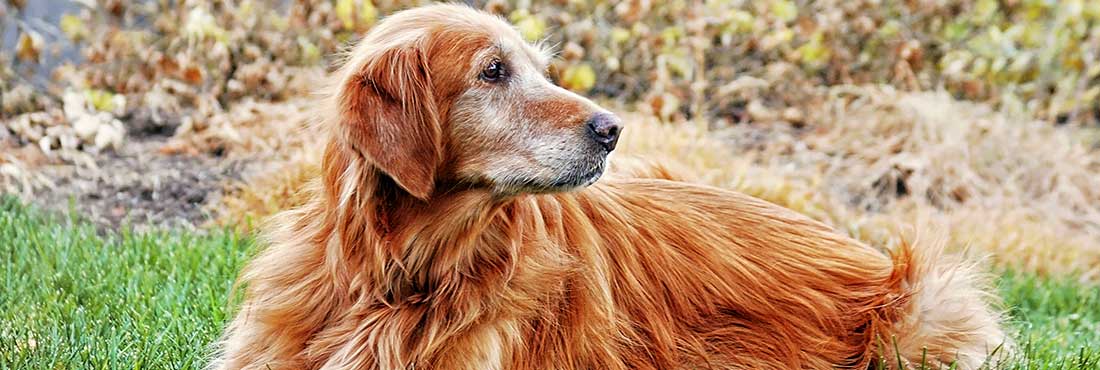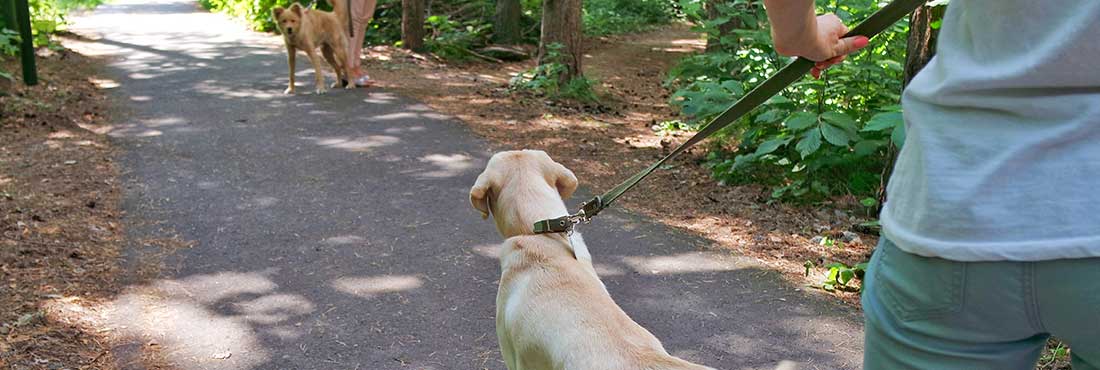Golden Retrievers make wonderful pets. Even if you are a cat person at heart, it’s hard to resist the charm of this particular dog breed as they fit into family homes perfectly. Labrador Retrievers are popular because they have a very friendly and happy nature. They are mellow creatures that can be trained easily and look super cute! This breed of dog is so likable that there have even been two American presidents that have owned them. These bouncy dogs are also highly trainable, so a Golden Retriever makes a good choice if you have never owned a dog before.
You can read more about their nature here.
Like any other dog breed, a Golden Retriever can be prone to several health issues. But so long as you keep them as healthy as possible, walk them regularly, and feed them the right food, then your four-legged friend should lead a long life.
The problem, however, is that they are not great dogs to own for allergy sufferers. If you have pet allergies, you need to read on…
Is a Golden Retriever Hypoallergenic?
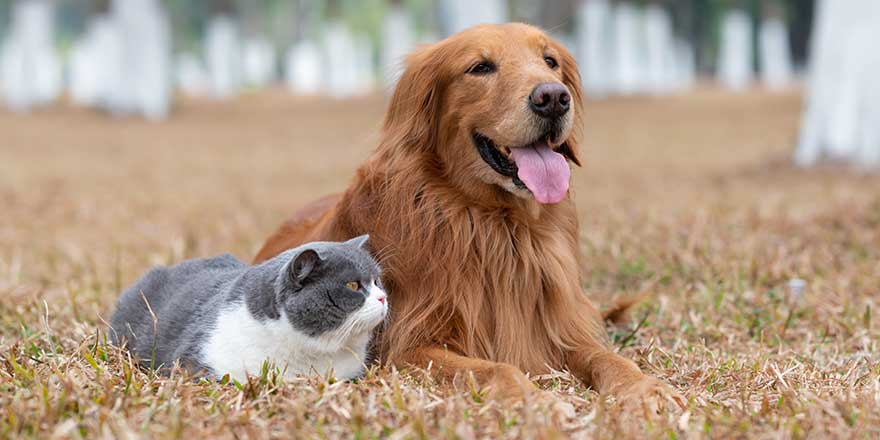
The beautiful double coat of a Golden Retriever is the feature that can cause the most allergies. Golden Retrievers have a lustrous, thick coat of golden fur that can vary in color, and one of the most commonly asked questions is whether or not a Golden Retriever is hypoallergenic. The answer to this is, unfortunately, no – Golden Retrievers are not hypoallergenic dog breeds.
Golden Retrievers shed often, which means they are not a great choice for people with strong allergies. Contrary to popular belief, it isn’t the dog’s fur that will cause an allergic reaction, but rather the pet dander, which is the skin surrounding the fur that they naturally shed.
It’s easy to see why people assume that the fur on Golden Retrievers is causing problems, as dogs with longer fur generally cause a greater allergic reaction. But the more often a dog sheds its fur, the more often it will shed its dander.
You shouldn’t feel disheartened, though, as there are things that you can do to minimize the effect of dander shedding and Golden Retriever Allergies. If you have a serious allergy, we wouldn’t recommend owning this type of dog with a double coat, but if your allergy is mild, then there’s still a chance that you could own America’s most popular dog!
The Myth About Hypoallergenic Dogs
Hypoallergenic essentially means “low allergy”, so when you choose a hypoallergenic dog, you will ideally look for a dog that doesn’t shed too often. Unfortunately, many people buy hypoallergenic dogs and assume they won’t get any allergic reaction, but sadly this is not the case. “Hypo” means low, so choosing a hypoallergenic dog simply means that that can create a lower allergic reaction – but they still are likely to cause a reaction, even if small. You should carefully consider this when buying a new dog, as pet allergies are no joke.
As we mentioned before, a dog’s hair isn’t the problem. It’s a popular misconception that dog fur causes an allergic reaction, but the skin that the dogs produce can be irritant.
Hypoallergenic dogs tend to have shorter or curly fur and shed less dander. It is worth speaking to a veterinarian or dog breeder for further advice, as some people have allergies to one type of dog and not others, and not all golden retrievers are the same.
Golden Retriever Allergies and Human Reactions

It is important to note that there is a difference between a severe dog allergy and an allergic reaction to dander.
If you are allergic to dogs, then you are allergic to the proteins in the dog’s dander, urine, and saliva. Human allergies can vary quite dramatically. Many people feel itchy around dogs, completely unrelated to fleas and mites. Dander is the main cause of human allergies and can cause hay fever-like symptoms such as sneezing and a runny nose. It can also cause red itchy eyes. A severe allergy to dogs can trigger an asthmatic response, which can cause difficulty breathing, chest tightness, chest pain, and wheezing when you breathe. You can also experience skin disorders such as hives. Eczema can be a reaction in dogs too.
These allergies are caused when your body reacts to an allergen such as dander which a dog produces, and your body reacts by producing antibodies. If you have an allergy to Golden Retrievers, your body reacts by thinking these allergens are harmful – although they’re not!
Dander is problematic in several ways. Firstly, it’s super small, so can collect around the house as “dust”. Secondly, because of the size of the dander, it can remain airborne for long periods, making it more likely to cause a reaction in those with an allergy.
You can do certain tests to see how allergic you are to Golden Retrievers. It might be a good idea to speak to your doctor first to see what test they can offer. It might also be a good idea to spend time with a Golden Retriever to see how your body reacts – a better choice for allergy sufferers might be an American Hairless Terrier!
How to Minimize Golden Retriever Allergies
If you are determined to buy a Golden Retriever and your allergy symptoms are minimal, then there are things that you can do to minimize the risk of an allergic reaction. Unfortunately, you can never remove the allergen itself, but certain things you can do if you have a dog allergy can make a difference.
As we know, dander is airborne, so the good idea is to buy a good quality air purifier. High-Efficiency Particulate Air (HEPA) purifiers are the best ones on the market for this particular purpose, and the vent filters work hard to reduce airborne allergens such as dander, and these devices are amazing for dog allergies.
Clean your house – often! This probably sounds like an obvious solution but can make a difference. Dust regularly with safe, non-toxic cleaning products that are pet-friendly and vacuum often. Remember, it isn’t necessarily dog fur that’s the enemy, but rather the teeny little skin particles that are hard to see. These little dander flakes will likely not be seen by the human eye, so even if your house looks spotless, it’s still worth cleaning and vacuuming surfaces regularly. This is easier if you live in a home with wooden or laminate flooring, as carpets are more difficult to clean and require extra work.
Keep your dog away from your furniture and bed! Of course, we are fully aware that having your pup on your bed is cozy and will keep you warm at night, but if you have an allergy, it will also keep you awake all night sneezing – not fun!
Certain medications can help reduce dog allergies and reactions. If you speak to a doctor or pharmacist, they may suggest taking a daily antihistamine to prevent an allergic reaction. Nasal spray can also help as well as decongestants.
Managing Golden Retriever Shedding
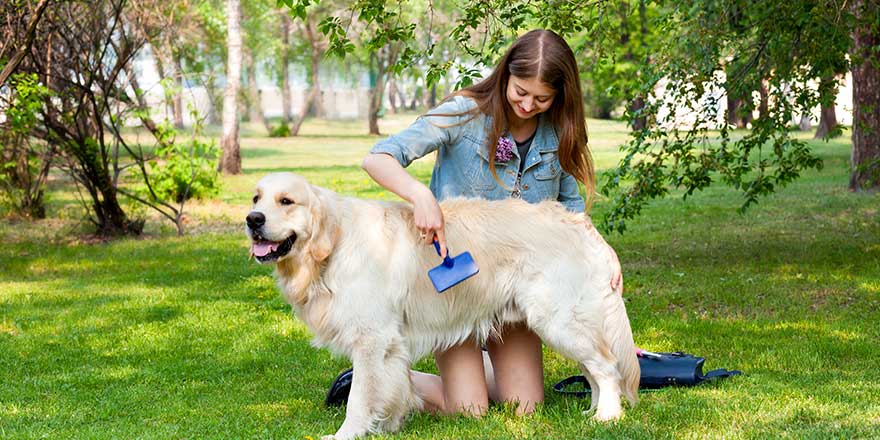
One of the best things you can do for an allergy-prone household is to groom your furry friend regularly. As we already know, a labrador retriever sheds a lot of furs! So the best thing you can do is encourage good grooming habits. Brush your golden retriever daily with a suitable fine comb designed specifically for your breed of dog. This will remove loose hair and dander and will help with dog allergies.
Bathing is important too, and while we know that this isn’t an easy task with such a big dog, it’s important when you have an allergy! For the best fur quality, skin quality, and healthy hair follicles, use a sensitive skin shampoo and aim to bathe your dog once a week. If your dog’s skin is happy and their fur quality is tip top, then there’s less chance of additional shedding. Be careful not to do too much bathing (even with a gentle dog shampoo), as this can cause the opposite effect – try to keep it to once a week.
It isn’t just the dog’s body that needs to be healthy, their mental health is vital too. Make sure that your furry friend is as happy and healthy as possible. Take your pup on regular walks to keep them fit, healthy and anxiety-free. A happy, socialized dog will shed less, which will benefit everyone. Healthy food and dog treats will ensure a balanced diet, and don’t forget to not overlook the fleas! Make sure you regularly use a good quality flea treatment, as fleas and ticks cause scratching and excess dander. A flea collar will keep this issue at bay.
Hypoallergenic Dog Breeds
If it doesn’t seem possible to own a Golden Retriever, there is hope! Certain dog breeds are known to shed less dander and are ideal for those with severe allergies. Other dog breeds produce dander but on a much lesser level.
Here are a few popular dog breeds for dog allergies:
Bichon Frise
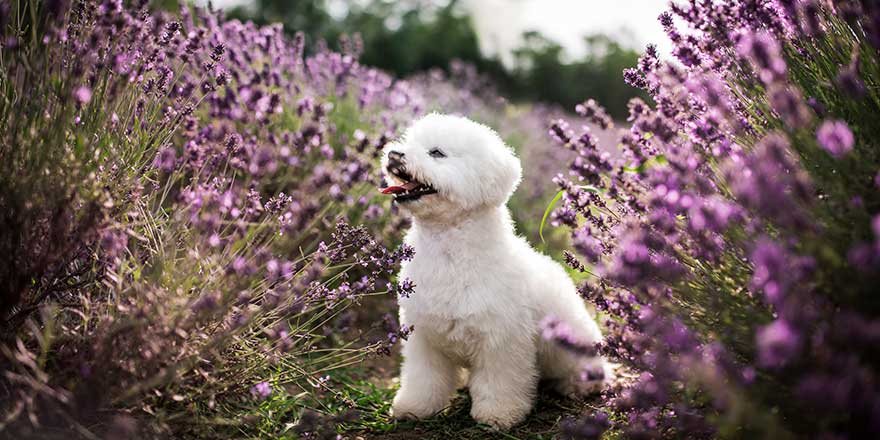
Curly coated breeds such as Bichon Frisse do not tend to shed excessively. The name translates into English as “curly lap dog,” and when you look at their dog hair, it is not difficult to see why this hypoallergenic dog breed is a better choice for those with allergies. These friendly dogs make great family pets.
Portuguese Water Dog
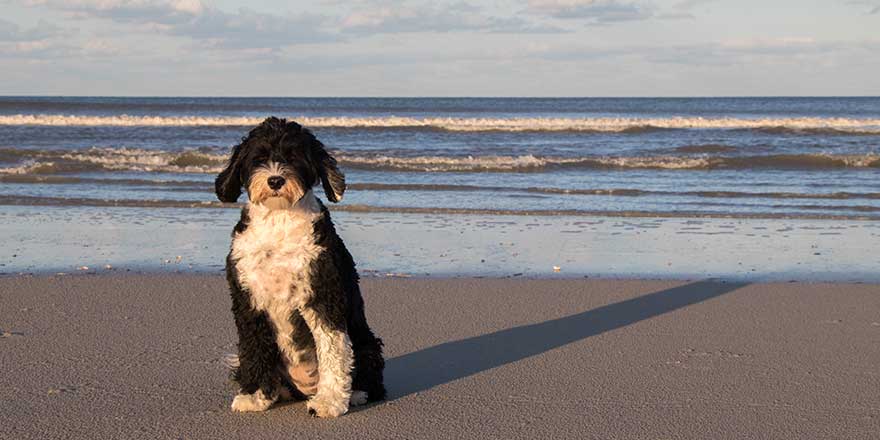
Originating from the Algarve in Portugal, these curly-haired dogs are not only super cute but also known to be one of the best hypoallergenic dogs. The dog’s coat creates minimum dander.
Labradoodle
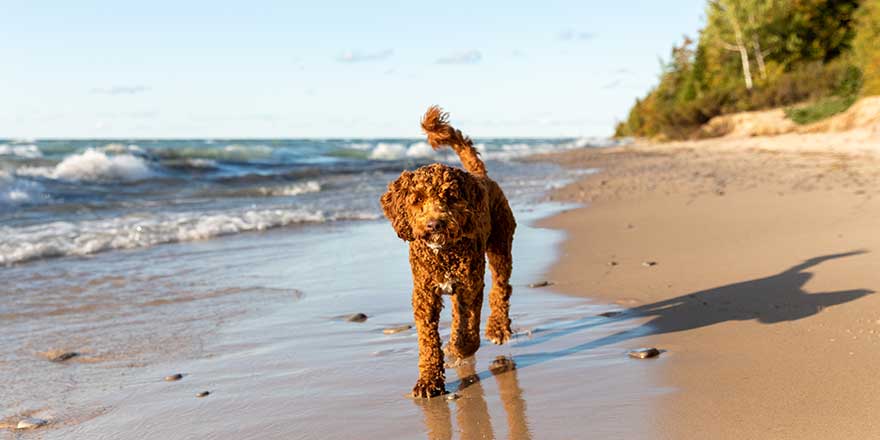
As you can no doubt guess from the name, Labradoodles are a mixed breed of Labrador and poodle. These family-friendly hypoallergenic dogs have short curly hair that doesn’t shed as often as longer-haired breeds, dog dander will be kept to a minimum, making this loyal dog a go-to choice for dog lovers with dog allergies.
Chinese Crested

When it comes to hypoallergenic dogs, it’s not too difficult to see why the Chinese Crested is a good choice for dog lovers. Hairless dogs do not shed excessively and are easy to groom. If you want to reduce dog allergies, then choosing mixed or hairless breeds is the sensible option.
Conclusion
In conclusion, the best thing you can do before buying a Golden Retriever is to spend time in a house with this type of dog to see how extreme your allergy is. Speak to someone who can offer pet medical advice and seek help from a doctor who can help you minimize your allergic reactions and triggers. Many dog owners have allergies and simply get them by taking a daily antihistamine which reduces the allergic response, but other options are widely available, too, such as allergy shots, nasal sprays, and more.
If you have a low allergy, living with a Gold Retriever is possible with the right attitude and knowledge. You will need to create the right environment for you and your four-legged friend and promote a healthy grooming routine and extensive cleaning routine.
It might sound like hard work, but the joy you will get from owning this family-friendly dog will be 100% worth it!

